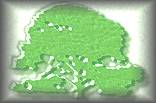

by Martin Watt Cert. Phyt.
There is evidence that some varieties were available in the region of the Nile, but precisely how they were used is still uncertain. However, it is clear from ancient texts that many medicinal plants were widely grown as well as imported into ancient Egypt. It is therefore highly likely that some of the medicinal properties of the chamomile's were known and appropriate use made of them.
CHAMOMILE'S: Modern research has shown that a hot water extract of Matricaria chamomilla has an antibacterial effect. It completely inhibits the growth of Staph. aureus, Streptococcus strains, Leptospira and Trichomonas. Leptospira are particularly nasty organisms, they are carried by rats and can enter the body through skin abrasions when working in contaminated water. Due to the extensive irrigation networks in Egypt it is very likely to have been a common illness and perhaps they knew how to treat it.
Matricaria OIL can exert a strong anti-inflammatory effect due to the α-bisabolol present in high amounts in some oils, this compound has been proven to exert a powerful anti-inflammatory effect on damaged skin, especially when the skin has been weakened and cracked by exposure to strong sunlight.
Anthemis nobilis OIL has been confirmed as having powerful anti-inflammatory
actions as well as exerting a strong sedative effect when administered
internally.
CELERY seed and stem: The stem has recently been found to have anti-inflammatory
activity when consumed as a food, and the research team suggested it may
be helpful for rheumatic disease and arthritis (prevalent in pyramid builders).
The seed oil has been shown to produce a mild increase in urine flow when
used internally in tests on dogs. Herbalist's have traditionally
used alcoholic extracts and whole celery seeds for arthritic problems,
but at least it is nice to get modern confirmation that we were correct.
Celery seed OIL is only mildly active against a few bacteria, but when
combined with other oil bearing plants it has a cumulative effect in enhancing
food preservation.
CORIANDER: This plants OIL has been shown to have mild anti-bacterial
properties and moderate anti-inflammatory actions if applied locally.
It has also been used as a carminative for spasms of the gastro-intestinal
tract.
GARLIC: Its medicinal properties have long been recognised,
some say the pyramids could not have been built without it. Certainly
one of the first recorded labour strikes was among the tomb builders in
the valley of the Kings. They marched on-mass to the temples when
hard times saw a reduction in their rations of which garlic was an essential
part.
JUNIPER: Tests were conducted in Italy in 1987 to establish the anti-inflammatory
activity of 75 plants used in traditional medicine. These tests showed
that juniper BERRIES extracted in alcohol (which was then removed) exhibited
a 60% inhibition of inflammation against a 45% inhibition by the drug indomethacin.
Juniper was used to alleviate headaches in Egypt, usually combined
with other plants with known anti-inflammatory action. It's possible
that as some headaches result from dilation of temporal arteries, that
application of these mixtures, would soothe the inflammation, reduce the
dilation and thereby reduce or stop the headache.
α- β-pinene & borneol, both constituents of juniper berry
and leaf oils, are bactericidal.
ROSEMARY: Sprigs of rosemary were found in Egyptian mummy wrappings,
perhaps a relaxant for the afterlife, or as a token preservative ?
Modern research has shown that rosemary OIL can cause an initial short-lived
stimulant effect on the central nervous system, followed by a lasting relaxant
effect on the smooth muscle of the gastro-intestinal tract. A component
of rosemary has been demonstrated to have a powerful anti-oxidant effect
(preservative). Rosemary OIL has mild anti-bacterial activity
and Moroccan rosemary has been shown to have a moderate activity against
pathogenic fungi.
WORMWOOD: The vapour of this plant was inhaled to stop a cough. Tests conducted in 1987 demonstrated that as well as possessing anti-bacterial activity, the OIL also has a very powerful anti-spasmodic activity. It must be emphasised that the Egyptians did NOT use distilled oils, therefore the use of the plant in the manner described is safe, BUT inhalation of pure wormwood OIL is not recommended as it could have toxic effects.
In 1988 research was undertaken in Iraq into the medicinal activity of Wormwood. This was because it was widely used in traditional medicine to treat diabetes mellitus. It was shown that oral administration of an aqueous extract did in fact produce a significant fall in blood sugar levels.
Wormwood extracts have long been used by Medical Herbalist's for
their potent worm expelling properties. As infestation of the
gut with parasitic worms is common in societies with primitive sanitation,
then it is very likely the ancients were well aware of the effects of this
plant.
Finally there is not space here to go into great detail on all the
medicinal, perfumery and culinary uses of the wide range of plants available
to the ancient Egyptians. As more scientific investigations are completed,
it is becoming increasingly clear that they had a sophisticated system
of medicine and almost certainly were fully aware of the medicinal properties
of a wide range of herbal remedies. In some cases they may have had
available potent remedies which even now science can not improve on.
Further reading:
"An Ancient Egyptian Herbal" by Lisa Manniche. I.S.B.N. 0-7141-1704-8
"An Enquiry into Plants" by Theophrastus of Lesbos 370 b.c.
© 1998 Martin Watt.
Martin can be reached at:
http://www.aromamedical.org, AGORA home page
AGORA home page |
 Go to the FAQ pages
Go to the FAQ pages |
 This site is hosted by Michel Vanhove
This site is hosted by Michel Vanhove |
Notes relevant to this article will go here.
-Michel Vanhove
AGORA Pages originally hosted on these now dead sites are now hosted on the AGORAIndex.org site when available:
- benzalco.com
- aromavitae
- aromatours
- FragrantDemon
Like us on Facebook at [Coming soon]
View our Twitter feed on this page.
©Aromatherapy Global Online Research Archive and it's individual authors. All Rights Reserved.